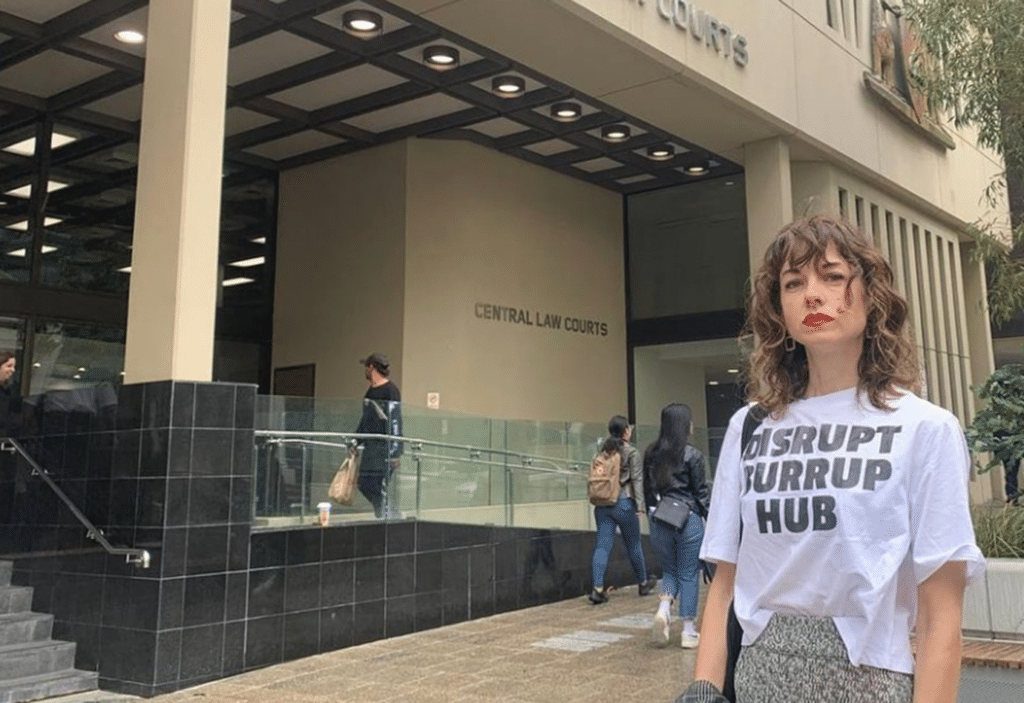Climate campaigner Joana Partyka has been convicted and fined in Western Australia for failing to allow police to access her mobile phone and laptop.
Partyka, a member of the Disrupt Burrup Hub group, pleaded not guilty to the charges and has said she will appeal against her conviction.
Partyka’s mobile phone and laptop were seized from her apartment by Western Australian Police earlier this year. She faced two counts of failing to obey a data access order when she refused to give police password access to her devices.
In court, Partyka, who works for the Australian Greens, said she had asked her employer for permission to allow police to access her devices but was told it would breach her employment contract.
Writing on Instagram after the conviction, she said: “The two charges I was defending came about as a result of a counter-terror police raid on my home in February, during which my phone and laptop were seized. Police tried to force me to give them the passwords to my devices so they could copy their contents. I refused, and was charged as a result.”
“During the trial, police openly admitted the raid was carried out in response to “potential future offences” – ones that to this day are entirely unspecified and for which I have never been charged.
“WA Police violated my privacy, deprived me of my liberty and breached the sanctity of my home in a chilling overreach that has not only gone completely unchecked – it has been reinforced and rewarded by today’s verdict.”
Partyka was fined $1,200 plus court costs. Outisde of court, Partyka said the fact that police had raided her home in relation to “potential future offences” that had not even occurred, was a “pretty distopian vision”.
The Disrupt Burrup Hub group is a campaigning group focused on opposing Woodside’s Burrup Hub mega-project at the Burrup Peninsula in north-west Western Australia. The group says the gas expansion project is a “disaster” for climate change. The area is also home to the largest, oldest collection of Aboriginal rock art in the world.
Partyka has previously made headlines when she spray-painted a Woodside logo onto the plexiglass covering an artwork in the Art Gallery of Western Australia. She was convicted over this act, and was issued with a fine and costs. She aimed to draw attention to the threat posed to Aboriginal rock art by Woodside’s Burrup Hub project.
At the time, she wrote on Instagram: “Mark McGowan says my actions are irresponsible; I say he and his government need to take a look in the mirror”.
The crackdown on Partyka and the Disrupt Burrup Hub group by the Western Australian government and police comes as climate protesters across the country and globe face increased pressure.
Another example comes from Queensland, where a group of climate activists who disrupted Queenlsand parliament for a few minutes last November could face years in prison.
The group entered parliament and chanted “stop coal! stop gas!”, which forced MPs to suspend parliamentary proceedings for three minutes. They were charged with disturbing the legislature – a charge that has not been laid in more than 30 years. There is a three-year maximum jail term associated with the charge.
Among the group is an 88-year-old woman, Judith Rasborsek, who previously told The Guardian, “Of course I don’t want to go to jail. But if they do sentence me to jail, so be it. What else can you do?”
Then there is the case of Violet Coco, the climate protester who had her 15-month jail sentence quashed on appeal when Judge Mark Williams ruled that she had originally been imprisoned based on false information provided by NSW police.
Coco, who drove a truck onto the Harbour Bridge and blocked a lane of traffic as part of a climate protest, was the first person in NSW to be jailed under new laws that aim to crackdown on protesters who block major infrastructure. The laws threatens protesters with up to two years in prison and $22,000 fines.
Other states have followed NSW in introducing harsh measures against environmental protesters. In Victoria, new laws have targeted protesters specifically at logging sites with the threat of 12-month jail sentences and $21,000 fines.
In Tasmania, anti-protest laws were passed by the Rockliff government in 2022, significantly increasing penalties and creating new offences for non-violent protest activities at workplaces and forestry sites.
At the time, Kieran Pender a Senior Lawyer at the Human Rights Law Centre, said: “Tasmania’s democracy is weaker for the passing of this bill. Even with the amendments, it is a bad bill that should never become law. This bill will have a chilling effect on the right to protest in Tasmania, limiting the ability of people to exercise their democratic rights.”


